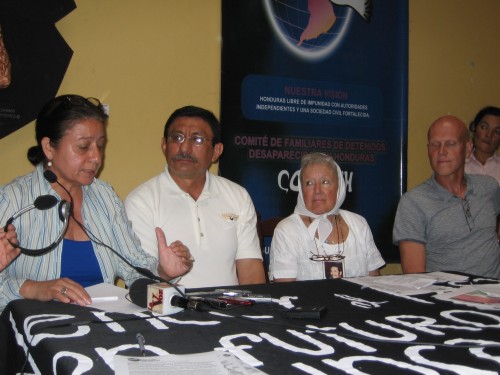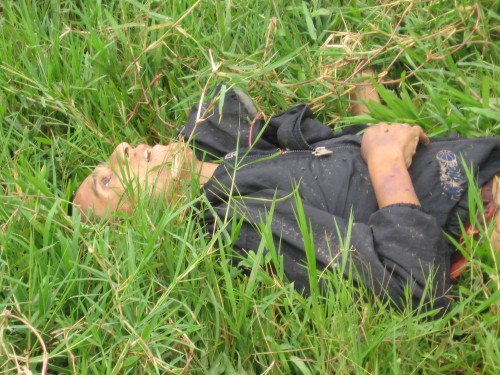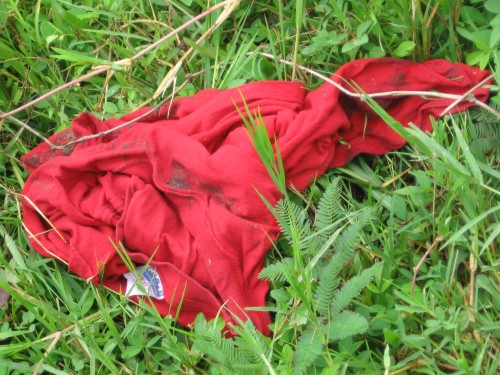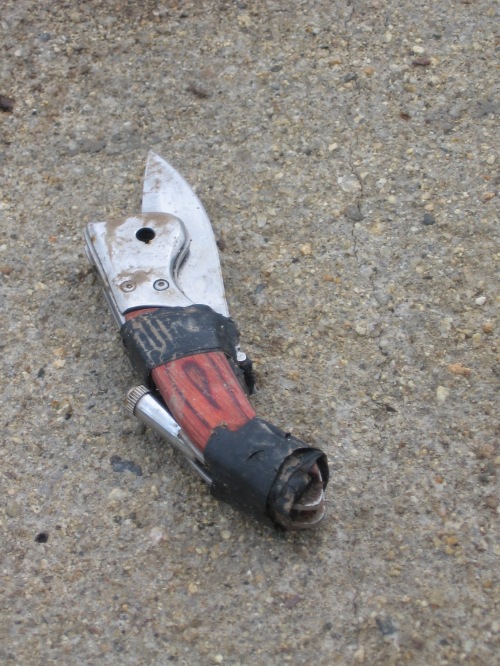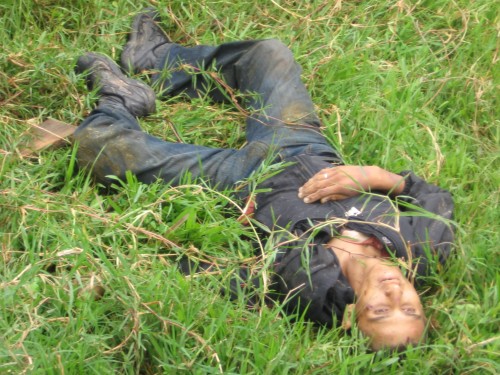By Jessica Pupovac, AlterNet. Posted August 7, 2009.
A national march against the coup in Honduras kicked off Wednesday, with demonstrators leaving from every corner of the country and marching up to 15 hours a day to demonstrate their support for the return of ousted President Manuel Zelaya. Organizers with the National Front Against the Coup say participants, including Xiomara Castro de Zelaya, the wife of ousted President Manuel Zelaya and popular Catholic priest Andrés Tamayo, plan to march 15 hours per day, through hills, rain and military checkpoints, converging early next week in either San Pedro Sula or Tegucigalpa, the country’s two main cities.
The march was planned following a vigil, held Monday, for two teachers and active coup resisters, both of whom died over the weekend. The first, Abraham Vallejo Soriano, 38, who was shot on July 30 during a march in support of the return of ousted Honduran President Manuel Zelaya. Then, on Saturday, while leaving Vallejo Soriano’s wake, teacher Martin Florencio Rivera Barrientos, 45, was stabbed more than 25 times.
Their deaths bring the total number of people killed for their participation in the resistance to the coup in Honduras to nine, according to an August 3 press release from the International Solidarity, Observation and Accompaniment Mission in Honduras, a delegation comprised of various Latin American and European human rights experts, academics and others.
Among the dead are also two union leaders, an LGBT movement leader, a radio journalist, and several young demonstrators, including Pedro Magdiel Muñoz Salvador, 22, whose body was discovered close to the Nicaragua-Honduras border two days after being taken into police custody, according to a statement released by the Inter-American Commission on Human Rights, an arm of the Organization of American States. The release says his body was found with “signs of torture,” which other sources say included at least 40 stab wounds. [Warning: graphic images]
“The Commission calls for an investigation into the killings and punish those responsible,” the IACHR statement reads. “The IACHR also calls for the de facto regime to take all measures to ensure the right to life, integrity and security of all inhabitants of Honduras.”
The International Mission’s July 23 report also cited 1,275 curfew and demonstration-related arrests as of that date. A massive crackdown during a national strike on July 30 is believed to have risen that number by at least a few hundred more.
The report from the International Solidarity, Observation and Accompaniment Mission in Honduras says the legal basis for the arrests comes from Executive Order No. 011-2009, requested by interim President Roberto Micheletti, which temporarily suspended constitutional rights while a curfew was in place. It was never renewed, according to the Mission, making its ongoing enforcement illegal.
In addition, the report says, constitutional rights, according to Honduran law, can only be suspended in the case of a foreign invasion or natural disaster — neither of which is currently the case. Nonetheless, its enforcement continues, leading to widespread militarization, repression and thousands of arbitrary arrests.
According to Abencio Fernández Pineda, former attorney for the non-government organization the Committee of the Relatives of Disappeared Detainees of Honduras, the crackdown on dissent harkens back to the 1980s, a time when the Honduran army, with U.S. support, waged a covert campaign against leftist leaders. According to the National Security Archive, a documentation project of George Washington University that stores information from declassified U.S. government documents, at least 184 people were disappeared during that era. Most are believed to have been kidnapped and executed by secret police units such as the notorious Battalion 316, which was trained and equipped by the CIA to advance U.S. foreign policy in the region.
The current regime enlisted a key figure from Battalion 316 — Billy Fernando Joya Amendola — to serve as Micheletti’s special security adviser.
“We’ve seen at least ten political, extra judicial assassinations of people participating in the marches, threats against political activists and journalists, at least three disappearances, a number of drive-by shootings; the streets are militarized. People are clearly concerned that we are going back to that time,” Fernández Pineda told AlterNet. “And then Billy Joya starts appearing on the television, and in the coup leadership. What are we supposed to think?”
Fernández Pineda is not the only one who is concerned. Human rights groups and the international Mission have also denounced the formation of what they are calling “paramilitary groups,” which they link to narco-traffickers and the business elite, often working in tandem with local police.
The sudden violence isn’t the only similarity to a darker era in Honduran history. Much like the U.S.-backed removal of Guatemalan President Jacobo Árbenz Guzmán in 1954, the removal of Manuel Zelaya followed a series of moves by his administration that the international business community worried might signal a shift towards a more populist economic platform. In August 2008, for example, Zelaya publicly joined the Bolivarian Alliance for the People of America (or ALBA, its acronym in Spanish), a regional economic development and equitable trade coalition. Although it has no bearing on the legally binding, U.S.-led Dominican Republic-Central American Free Trade Agreement (commonly referred to as CAFTA), Zelaya’s association with Venezuelan President Hugo Chavez, who started the Alliance in 2004, raised more than a few eyebrows. Then, in December 2008, Zelaya raised the minimum wage in Honduras, one of the poorest nations in the hemisphere, from $157 to $289 dollars a month, except in free trade zones.
Lynda Yanz, Executive Director of the Maquila Solidarity Network, said in a July 28 release that “businesses and business associations — including those in the textile and apparel industries, which account for the majority of Honduras’ exports — have publicly supported the coup, lobbied against trade sanctions, or remained silent and carried on business as usual under the military-imposed regime.”
While there are reports of multinational corporations forcing their workers to attend pro-coup demonstrations, in an official July 27 letter to Secretary of State Hillary Clinton, Gap, Nike and Addidas, all of whom have extensive operations in Honduras, claimed that the companies do not “support or endorse the position of any party in this internal dispute.”
Yanz applauded that letter, saying it “breaks that silence and calls unequivocally for the restoration of democracy in Honduras.”
“The question that remains is: Where are the other companies that are doing business in Honduras, including the three largest foreign investors in the country’s apparel sector — Fruit of the Loom/Russell Corporation, Hanesbrands and Gildan?”
Meanwhile, the U.S. government has itself been criticized for not taking a firmer stance against the coup regime.
Although in recent weeks the U.S. has reportedly cut off $18.5 million in military aid to Honduras and suspended the visas of select coup leaders, Washington has fallen short of calling the forcible removal of Zelaya a “coup,” thereby leaving untouched a reported $180 million in foreign aid flowing into the coffers of Honduras’ current administration, in violation of the Foreign Appropriations Act, which requires that the U.S. suspend all aid to any country “whose duly elected head of government is deposed by military coup or decree.”
“There are legal issues there that we have chosen not to exercise at this point,” said U.S. State Department Assistant Secretary Philip Crowley at an Aug. 3 press briefing. “But clearly, in every way possible, we have said that what happened in Honduras is a violation of the OAS Charter, which is why we took action against Honduras. It’s a violation of the Inter-American Charter, the Inter-American Democratic Charter. And we continue to work intensively to try to resolve the situation.”
But the resistance movements in Honduras, and their supporters in the U.S., are calling upon the U.S. government to take a stronger stance against the de facto regime, and make a clear distinction between U.S. foreign policy in the 80s and 2009.
Acts of defiance against the coup regime are growing daily. Just this week, students and faculty at the Autonomous University of Honduras closed down the roads around the university in an act of protest, setting off violent clashes with police. After about 20 demonstrators were injured, including the dean of the university, Julieta Castellanos, who later threatened to sue the police.
Meanwhile, community members have been keeping 24-hour watch over Radio Globo, a progressive radio station providing one of the only sources of reporting on the repression in Honduras. The de facto government has taken multiple steps, including a judge’s order, military force and public threats, to attempt to shut down the station, but have been blocked by throngs of demonstrators that have risen to the station’s defense. According to Dr. Luther Castillo, press secretary for the National Front against the Coup in Honduras, as many as 50 volunteers occupying the station in shifts, to provide security for Radio Globo staff.
Castillo told AlterNet that human rights violations, including threats and violence against the media, drive-by shootings to intimidate movement leaders and the illegal detention of hundreds, are escalating in Honduras daily — but only adding strength and legitimacy to the movement to return Honduras to the rule of law.
“Fear is not really increasing,” said Canadian blogger and activist Sandra Cuffe, who has spent much of the past six years working with popular movements in Honduras and who has been reporting from the ground every day since the coup took place.
“Outrage and indignation and determination and courage are … [But] people are still out on the streets every day.”
Jessica Pupovac is an adult educator and independent journalist living in Chicago.


